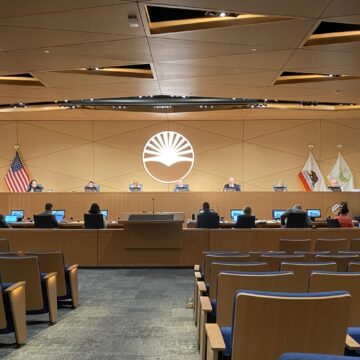While Sunnyvale will ask voters to approve some changes to the city charter this November, a more significant overhaul could be coming in two years.
The Sunnyvale City Council plans to update some of its city charter language — including removing citizenship requirements on various city commissions — which voters need to approve in November. But councilmembers are looking further down the road toward more weighty changes, such as switching to ranked-choice voting.
David Newswanger, volunteer coordinator for Sunnyvale on behalf of the California Ranked Choice Voting Coalition, said changing the voting style would improve the way city elections operate. He said occasionally, people do not run for certain seats because they are afraid of taking votes away from other candidates. With ranked-choice voting, that becomes a non-issue.
“It tends to decrease animosity in campaigns that are heated … so the campaigns have been shown to be more civil,” Newswanger told San José Spotlight. “Ranked-choice voting is well liked in many cities that use it now.”
Ranked-choice voting allows voters to select their first, second and third choices for elected officials. If a resident’s first choice is eliminated from the race, their vote shifts to their second choice. The process continues until a single candidate garners a majority of votes.
Last October, the governor approved a state bill letting Santa Clara County conduct countywide elections using ranked-choice voting, but a 2022 push to adopt the system in San Jose failed. Bay Area cities that already use ranked-choice voting include San Francisco, Berkeley and Oakland.
Californians for Electoral Reform President Steve Chessin said at the Jan. 30 council meeting that a poll of Sunnyvale voters showed 68% support switching to ranked-choice voting. Chessin told San José Spotlight ranked-choice voting better indicates which candidate voters prefer because it does not allow for plurality elections, which is when no candidate receives more than 50% of the vote.
Ranked-choice voting was one of nine potential changes brought forward in a memo filed last November by Mayor Larry Klein and Councilmembers Alysa Cisneros and Richard Mehlinger. The memo included looking into whether the mayor’s role should be full-time, councilmembers’ compensation and handling council vacancies. The trio suggested creating a Charter Review Commission to discuss the items, which was unanimously agreed.
“Overall, I think it would be very important to have the community be a part of all of it, especially given how core a lot of these decisions are to the governance of the city,” Councilmember Omar Din said.
Assistant City Manager Sarah Johnson-Rios and City Manager Kent Steffens fielded questions from council about workload for city employees and the plausibility of establishing a commission ahead of this year’s election, but councilmembers concluded more time was needed.
Certain topics are more complex than others and require more research, Steffens said. Others are more manageable, such as removing gendered language, changing the number of meeting requirements and removing citizenship requirements on various city commissioners.
“I would put ranked-choice voting as one of those that are very, very complex,” Steffens said. “There’re some that are pretty straightforward … There may still be a lot of public input and debate.”
For the approved issues, city employees will come back to the city council with proposed ballot language closer to the Aug. 9 election filing deadline.





